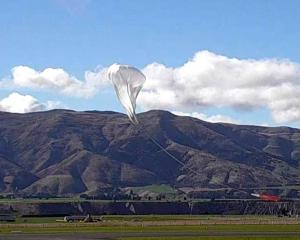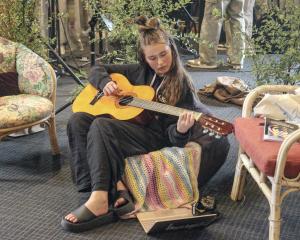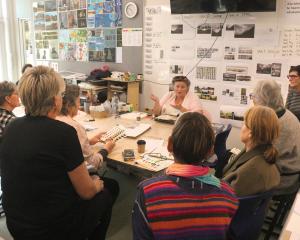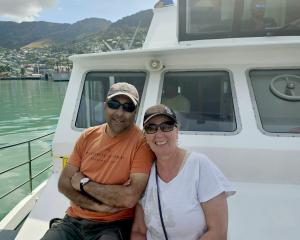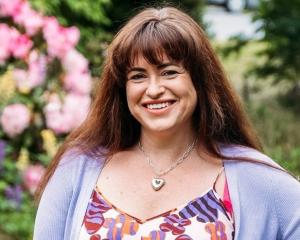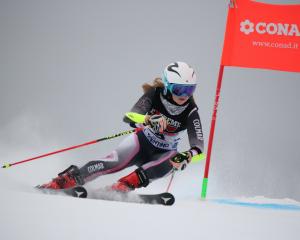
Last night two organisations in Wanaka followed a tradition.
The Wanaka Chamber of Commerce and the Wanaka Residents Association organised a public meeting so voters could take a good hard look at the candidates for the Queenstown Lakes District Council.
But in what appears to be another tradition, Otago Regional Council candidates were not invited.
Chamber president Alistair King: "They’ve never been involved I guess. It’s just something we didn’t think about."
So, for Wanaka voters — surrounded by water quality and pest problems — there will be no opportunity to meet, en masse, the five candidates vying for a seat on the body responsible for dealing with those issues.
And, so far, the same appears to be the case in Dunedin, Queenstown, Balclutha, and Alexandra.
Palmerston, Omakau and Cromwell are exceptions.
The East Otago Review newspaper has organised a public meeting at the Waikouaiti Events Centre at 7pm on Tuesday and invited district council and community board candidates, as well as regional council candidates, and organisations in Omakau and Cromwell have done the same.
Former long-serving regional councillor Duncan Butcher credits his wife, Maureen, for the traditional Cromwell meeting.
As a member of the Cromwell Rotary Club, she insisted during his term on the council that all candidates for public office had an equal opportunity to face the voters and state their cases.
But, beyond Palmerston, Omakau and Cromwell, regional council candidates wanting more time with voters this election have been left to their own devices.
That has prompted career politician and Dunstan ward regional council candidate Michael Laws to organise public meetings in Wanaka, Frankton, Alexandra and Cromwell.
"The lack of opportunities to hear and debate with candidates is not good for local democracy," Mr Laws said in a press release this week.
He has invited all other regional council candidates to attend the meetings, to speak and answer questions.
His opponents will be allowed, he says, "brief statements about priorities and qualifications" and then to answer questions from the floor.
Only one candidate, Maggie Lawton, of Wanaka, has so far accepted.
Opponent and sitting member of the council Gerry Eckhoff is not going, and is treating Mr Laws’ invitation with suspicion.
"Michael Laws is a very streetwise politician and he absolutely knows how to extract an advantage in this political process of ours.
"I see no reason for me personally to assist Michael with his campaign by attending one of his public meetings.
"He has certainly offered us the opportunity to speak but he controls the meeting.
"It’s not like a Lions Club or a Rotary Club or Grey Power or whatever who have an independent chair.
"This is his meeting.
"He is running it.
"He is controlling it.
"I guess I’m a little wary of Greeks bearing gifts."
He did however, admire Mr Laws’ initiative.
Mr Laws believes the council itself could have provided more opportunities for candidates and voters to engage.
"Their inactivity suits incumbents so new candidates must work harder to engage the voting public," he said.
But the council’s leadership does not see it as the council’s job to provide candidates with campaign opportunities.
In response to an ODT email, chairman Stephen Woodhead said responsibility for setting up meetings lay with the public, "definitely not councils".
Council chief executive Peter Bodeker told the ODT it was ‘‘not appropriate’’ for the council to organise meetings.
The council, he said, had to be careful not to be seen to be promoting particular candidates.
Candidates surveyed by the ODT had mixed views on whose responsibility it was to connect them with voters.
Sitting councillor and candidate Gretchen Robertson said it was up to candidates.
"The greatest responsibility for getting involved lies with the candidate."
Long-serving councillor and candidate Michael Deaker agreed.
"With so much personal communication available, there’s not so much need for the mass media and public meeting style of opportunity."
But former regional council staff member and now candidate John Threlfall said the council was flying "under the radar".
"How many organisations have the luxury of being able to spend that much money [$30million] but manage to be so far under the radar that ratepayers don’t know what they do?
"To get voter interest, far more needs to be done."
Dunedin ward candidate Pat Wall said a lack of election meetings favoured those with "name recognition ... be it an incumbent or having been a radio talk show host".
"Often times, if people know a name they may choose that person regardless of their suitability for the position."
Dunedin candidate Trevor Kempton said being a sitting member had value during an election campaign.
"I ... regard my visibility as a councillor and my reported contributions as a councillor during the last term as part of my engagement. I think this is as significant as anything I might do in the few weeks running up to the election."
But he also believed "the shape" of democracy was changing.
"Social media and instant issue-based polling mean people know they can put pressure on their elected representatives on a daily basis. Who they are and what they stand for seems, sadly, a little less important."
Last night’s public meeting in Wanaka cost the chamber and the residents’ association about $200 for tea and coffee, etc, and the district council provided the venue free of charge.
Mr King said it was not the chamber’s responsibility to hold such meetings but it always had done and he believed they might be of value to its members.
"It’s just trying to make sure our members get a chance to pose a few questions."
● See Wednesday’s ODT for our 8-page election special, which includes coverage of ORC candidates.
What the Otago Regional Council does
"The Otago Regional Council exists to promote the sustainable development and enhancement of Otago’s resources. We work to ensure that these unique resources are used in a way that preserves them for future generations. As well as looking after the environment, we must take into account the people of Otago — their economic, cultural and social needs."
— Source: Otago Regional Council


